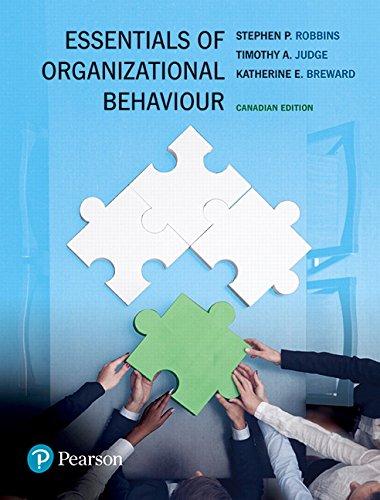Changing a deeply entrenched organizational culture can be very difficult, as the Canadian Royal Mounted Police have
Question:
Changing a deeply entrenched organizational culture can be very difficult, as the Canadian Royal Mounted Police have discovered. The widespread prevalence of sexual harassment of female officers in the service resulted in the launch of a class action lawsuit in 2012. Efforts to address this problem have focused on enforcement of antiharassment policies and on changing the patriarchal, macho culture associated with the RCMP.
Stories that have emerged as a result of the lawsuit have highlighted the extent of the problem. Female officers have reported incidents ranging from inappropriate joking to having pornography and sex toys left in their workspaces. Others have reported unwanted physical contact, up to and including being raped by fellow officers. Official responses to complaints were generally inadequate, with many women reporting that they, as complainants, were put on leave while their harassers received extremely light sanctions, if any. In one case a female officer was still away on administrative leave a year later “pending investigation” while the officer she had accused of rape was promoted.
Part of the reason the RCMP has had such difficulty addressing these issues is that they are not “change ready,” according to Dr. Linda Duxbury, who wrote an independent report assessing their culture. She reported that the general culture was “exploitative, paramilitary, respectful of the position rather than the person, low trust, risk adverse, and defensive.” The culture has also been characterized as patriarchal and “macho.” Dr. Duxbury further characterized their culture as “a victim of the success spiral, which occurs when an organization holds on too long to a culture in the belief that what has worked in the past will continue to confer a competitive advantage in the future. The RCMP has failed to realign its organizational culture to take into account new environmental realities. This has resulted in key elements of RCMP culture being liabilities as the organization moves forward with reforms.”
Bob Paulson, the RCMP Commissioner appointed in 2012 to fix the mess, has openly admitted to a culture of bullying and associated inadequate harassment investigations. He stated that his “mandate was to clear-cut problems that have taken root so deeply in the police culture that some Mounties are now embarrassed to tell neighbours where they work.” The numbers are telling—in the four years before Paulson’s appointment, the number of female cadets at the RCMP dropped by 52 percent. Currently only 20 percent of the 19,000-member force are women. Change will not be easy, though. Paulson has committed to new policies, enforcement of existing policies, and ongoing monitoring of results, but he recognizes that it is a difficult road given the strength of the existing culture.
Discussion Questions
1. Why do you think the culture within the RCMP is so strong and deeply rooted? Does the nature of the job itself impact the strength of the culture? Why or why not?
2. What specific steps and policies might help encourage a more ethical and equitable organizational culture?
3. Discuss the role a leader plays in organizational culture maintenance and change. Was the change in leadership necessary in this situation? Why or why not?
Step by Step Answer:

Essentials Of Organizational Behaviour
ISBN: 9780134182971
1st Canadian Edition
Authors: Stephen P. Robbins, Timothy A. Judge, Katherine Breward





